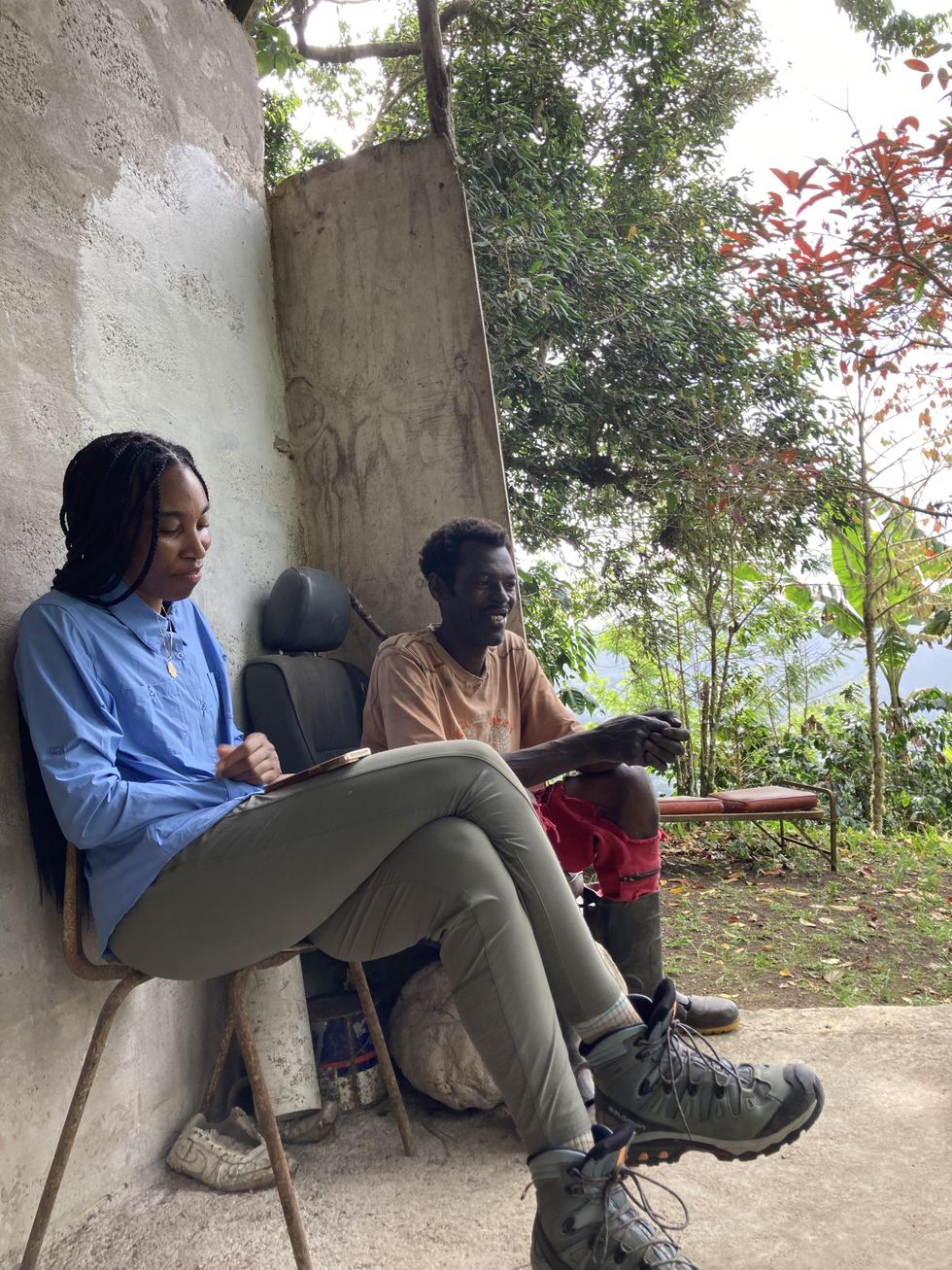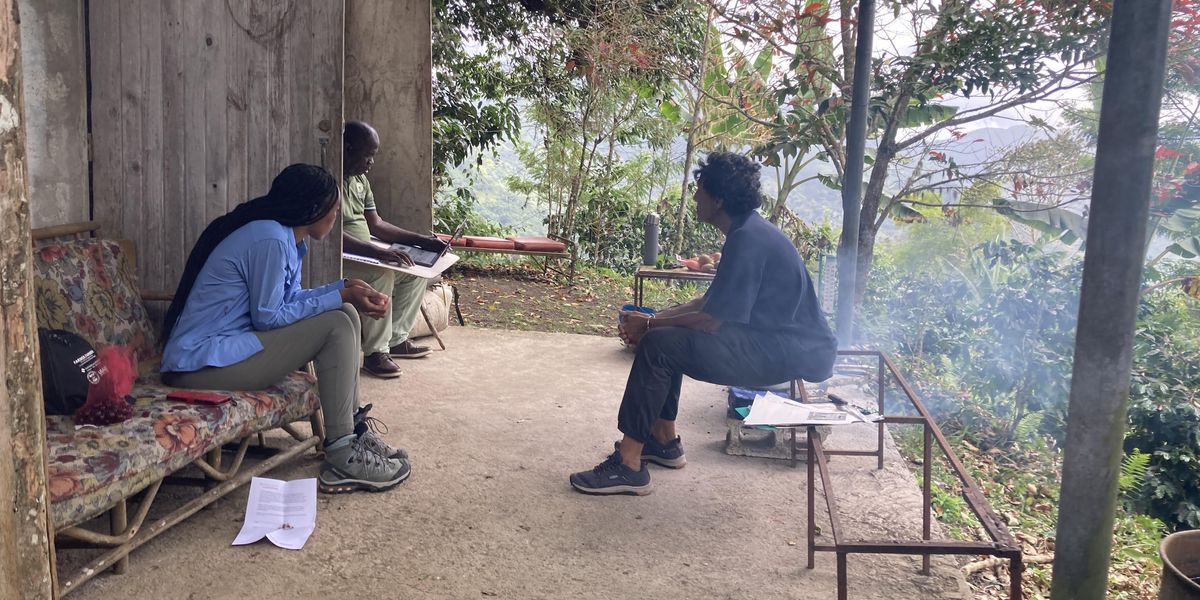Opinion: The global food system is failing small-scale farmers — here’s how to fix it
Maybe we don’t need Jamaican coffee in the middle of US winter.
I held her as she wept into my shirt while my lab mate ran across the coffee field to get tissues.
We were standing on a coffee farm 7,500 feet above sea level in the middle of the Jamaican Blue Mountains. Before she broke down, the woman was telling us about her life as a farmer. Weeping was commonplace throughout my interviews in Jamaica. Farmers told me how fertilizer prices skyrocketed because Russia is the world’s top fertilizer exporter and the Russian invasion of Ukraine made it nearly impossible for them to afford the increased costs. I also heard stories of how unattended rural roads make it impossible to maintain vehicles. However, during this interview this woman was one of a few who told us about a more local economic issue: farmers have no control over the value of their crops because local corporations control the market. She explained how for farmers to produce enough to make a living, they need fertilizer and pesticides, which are expensive.
Agrochemical companies spend billions of dollars to ensure that industrial farms can maintain a crop year-round —so that Jamaican Blue Mountain coffee beans get from a farmer’s bush in Portland Parish of Jamaica and into your hands at your local grocery store, even in the middle of February. But the labor of small-scale farmers is not calculated into these companies’ profit margins, leaving the people who grow those coffee beans crying on the shoulder of anyone who would listen.
The global food system is broken. We have seen the latest examples wreak havoc across the world this past year: wheat production in Russia declined with the start of the Russian invasion of Ukraine; Hawai’i’s governor wants to grow more food on-island because recent studies have shown that if they were to be hit by a natural disaster, they would only have three days’ worth of food as they rely on imports for survival. Meanwhile, industrial agriculture emits one-third of the world’s climate-warming gases. But the biggest example of how broken the system is: small-scale farmers, which produce more than 70% of the food we eat, are often the populations with the most malnourished individuals living in absolute poverty.
This essay is also available in Spanish
If humans want to withstand upcoming and ongoing climate disasters, our food system needs to change. It is time to shift away from industrial agriculture. We need to produce our food in ways that give back power to those who produce, distribute and consume food so they can change and design the mechanisms and policies that govern food production and distribution.
You have the power to change what happens to your food before it's on your plate or in your cup by integrating a relationship with farmers and the land around you into your daily lifestyle.
How has agriculture changed throughout history?

Author Alexa White interviewing a farmer in the Jamaican Blue Mountains.
Credit: Alexa White
The Jamaican woman I interviewed at the Blue Mountains reminded me of my history with agriculture. My grandparents were sharecroppers in the deep South during the Jim Crow era. Throughout my life, they explained they were forced to produce crops that white landowners wanted to sell in markets, and, as a result, my family had little to no control over what they ate or how much money they made. Millions of African-Americans were cogs in the machine of what we in academia know as the industrial agriculture food regime.
A food regime is, in simple terms, how food is produced in a certain society during a specific period. For example, between 1870-1914, tropical fruits, vegetables and crops like sugar were shipped from colonies to Europe, where a new industrial class was growing. That era was called the colonial food regime. But as we approached 1945, industrialized countries, also known as the Global North, pushed former colonies (the Global South) toward industrialization, injecting into their fields with crops like wheat, corn, or soy –and the pesticides needed to help them grow to industrialized standards – and the use of agricultural technology, such as tractors. This led us to today’s food regime: agriculture is characterized by the overuse of fertilizers, large extensions of single crops known as monocultures, and, most importantly, pesticides. It’s the era of the corporate food regime.
Jamaica is a prime example. The third-largest island of the Greater Antilles, there are 14 parishes in Jamaica, of which 13 produce coffee. The high mountains crossing the landscape of the Caribbean archipelago nation infuse a uniquely earthy and herbaceous flavor to Jamaican coffee beans. Due to this limited production and high demand, this coffee is also significantly more costly and sold internationally by large-scale companies.
In Jamaica and elsewhere, this food regime is taking an enormous toll on the environment, from polluting waterways to endangering public health through disease outbreaks and pesticide exposure, to exacerbating climate change. Industrial crops require fertilizers, pesticides, insecticides, and other intensive materials to kill all other organisms that might touch our food. Cattle production requires clearing large swaths of land, and all plant life that would have been sucking CO2 from the surrounding atmosphere is gone and replaced with livestock. As a result, one-third of the world’s carbon emissions come from agriculture.
What do the farmers think about industrial agriculture?
After the weeping subsided, the woman I interviewed had a lot to say about the Jamaican food system. She wasn’t the only one. When I sat down with farmers of all ages across the Jamaican Blue Mountains to understand the choices they had made and where they saw themselves in the grand scheme of the global food system, I realized many of them had family ties to agriculture that reached back generations. They told me how they prefer small, local business owners to buy their crops because they treat them better than larger corporations. Mr. Brown, a coffee farmer with 40 years of experience, said of the small business owner he works with?, “He’s a small farmer like us, and he knows the benefit of it, so he pays us more than the other people that come in to buy would buy for, you know?”
Walking with them through their farms, I saw that the crops growing alongside the coffee were not foods that they would take home to eat but rather foods that they needed to sell for export. Yet that diversity did not bring in enough additional money. Most of the companies, mostly led by non-Jamaican men, that buy their crops are only interested in coffee production. Even when these companies would buy other crops, they would pay them a minuscule amount compared to what they would make from the coffee on the international market. If you compare the prices of the fertilizers, manure, and other inputs needed to produce enough coffee to satisfy these companies with their rising costs, they would probably not be able to last until next year, farmers told me. Mrs. Crew, a third-generation farmer, explained, “It’s giving us a hard time, so I say maybe that is what is going to push small farmers out of the business.” Small-scale farmers are stuck in limbo, as they need to produce enough food to sell to the companies that control the market, which forces them to use expensive inputs that make it possible to get the crop yields the buying companies require. Profit margins are small –and farmers struggle to put enough food on their table.
As a result of this unjust arrangement, half of the world’s undernourished population (about 407 million people), 75% of Africa’s malnourished children, and most people living in absolute poverty live on small farms. That means that those living on the nearly 500 million small farms on this planet do not seem to benefit from their contributions to the world’s food security.
What can be done to help small farmers and tackle hunger?
For years now, sustainable development circles have debated changing the agricultural system as an urgent task if humanity is to have a livable future. A lot of attention has been given to pushing small-scale farms to increase production to “feed the world’s growing population.” And yet, small-scale farms already produce enough food to feed the world. Therefore, international initiatives to address world hunger should include small-scale farmers’ perspectives and participation.
But that won’t be enough.
To drive ourselves away from industrial agriculture we have to embrace the ideals of the food sovereignty movement –a movement that advocates for a food system in which the people who produce, distribute and consume food also control the mechanisms and policies of food production and distribution. It stands in contrast to the present corporate food regime, in which corporations and market institutions control the global food system. Food sovereignty requires us to rethink our relationship with food. It invites us to recognize, for example, how unnatural it is to expect to drink a cup of Jamaican Blue Mountain coffee on a cold February morning. A good way to start developing a more intimate relationship with food can be by consuming food from nearby food cooperatives or Community Supported Agriculture systems, which you can find using websites like Local Harvest or the Co-op Directory. Buying your food from Black, Indigenous, or POC-owned farms helps to re-distribute wealth to small-scale farmers.
Food is an environmental issue that we encounter every single day, yet as an international society, we chose to ignore the people who help to get food to our table and do nothing to end the oppressive systems impoverishing them. There must be a major shift in how our food systems operate. This can begin with you.
This essay was produced through the Agents of Change in Environmental Justice fellowship. Agents of Change empowers emerging leaders from historically excluded backgrounds in science and academia to reimagine solutions for a just and healthy planet.







